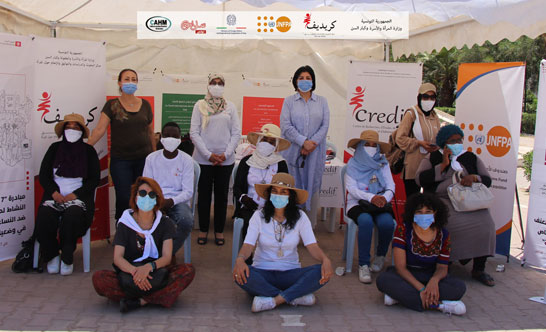MIGRATION
7 DAYS OF ACTIVISM: A RIGHT IS A RIGHT

7 days of activism
The United Nations Population Fund (UNFPA Tunisia) in partnership with CREDIF launched, from June 7 to 12, 2021, a campaign under the title of "7 days of activism against violence against women and persons with vulnerabilities” and that in the governorate of Medenine. This initiative was also implemented in partnership with the Salamet - Tunisia program.
The campaign was a comprehensive and integrated action that relied on the diversity of formats and beneficiaries, to maximize the impact and foster a dynamic of change in representations, mentalities, and practices. This initiative was accompanied by the slogan الحق حق "(A Right is a Right), which reflects the comprehensive and universal approach to human rights without any distinction.
The overall objective of this initiative was to contribute to the elimination of violence against women and people in vulnerable situations, especially migrants, asylum seekers, and refugees.
Through this initiative, we have come first to strengthen the capacities of 20 local media professionals on Human Rights, gender-based violence, cyber-violence, and digital security.
Secondly, we held a capacity-building workshop for 21 police and national guard officers on the management of migrant women, asylum seekers, and refugees in vulnerable situations.
Third, we organized awareness-raising workshops for migrant, asylum-seekers, and refugee communities on gender-based violence, sexual and reproductive health, digital security, and available services. 25 Arabic-speaking, French-speaking, and English-speaking persons took part in these workshops. These two sessions were very interactive, creating a safe space where migrant women were able to freely express their traumatic and violent experiences, whether during their migratory journey, their arrival on Tunisian territory, and during their journey.
Lastly, a field campaign took place to sensitize the general public on the experiences of migrant women, victims of multiple gender-based violence. 6 volunteers surveyed around 300 persons on their perception of violence against migrants, especially migrant women, and the legal dispositions on this matter.
Finally, the two partners aim to further strengthen the involvement of journalists/media and to contribute to the establishment of a culture of quality journalism, sensitive to gender and respectful of human rights. To do this, it is planned to develop a digital information tool intended for the media and journalists to ensure a better understanding and use of concepts and terminology related to migration, sexual and reproductive rights, and gender.
MIGRATION
TOWARDS MIGRATION MAINSTREAMING IN CARE PROVISION: DETECTION OF TRAFFICKING VICTIMS
UNFPA staff provided training for 22 staff members of partner NGOs on detection of potential victims of trafficking and referral to the National Authority for Combating Trafficking in Persons and other competent institutions, INGOs, and bodies. The training provided the beneficiaries with the legal framework regulating the response to Human Trafficking in Tunisia, a set of signals and symptoms to look for when receiving a potential victim. The training was a first for these NGOs who services thousands of migrants per year. The beneficiaries acknowledged the lack of competencies on the topic and how they might have overlooked some victims in the past.
MIGRATION
TOWARDS IMPROVED DATA AND KNOWLEDGE ON MIGRATIONS IN TUNISIA
As part of UNFPA’s commitments to improve data and knowledge production to better inform policies and programs, we conducted during the last quarter two studies aiming at exploring new subjects and areas of UNFPA’s mandate in relation to migrations.
The first study aimed at assessing the capacities of SRH centers to integrate comprehensive GBV care; the second one explored the journey and the drivers of LGBTIQ ++ migrants in Tunisia.
For the first study, UNFPA selected three SRH centers run by ATSR. The choice was motivated by the presence of the NGO in different cities where GBV care is not optimal and sufficient. The assessment of Médenine, Tataouine and Tunis centers provided UNFPA and ATSR’s teams with insights on how to integrated GBV care at SRH services, to remedy the under-reporting and detection of violence cases; and to build upon an existing and institutionalized local coordination.
The assessment pointed out each level of required actions and interventions to make the integration straightforward and efficient. The assessment is available for consultation upon request and authorization from the partners.
For the second study, it aims to explore the situation of migrants / Refugees / Asylum seekers, belonging to the LGBTQI + community in Tunisia and to understand the migratory path of this population, their motivations, expectations and vulnerabilities in Tunisia.
This study made it possible to document the journey of these individuals along with their multilayered vulnerabilities and exposure to stigma, whether because of their migratory status or their identity. The study underlined the difficult conditions pushing these individuals to seek better life in Tunisia; persecution in their homeland, fear of rejection, legal threats, or even death threats. Once they reach Tunisia, it takes them few moments before realizing that Tunisia, is not the safe haven they imagined.
